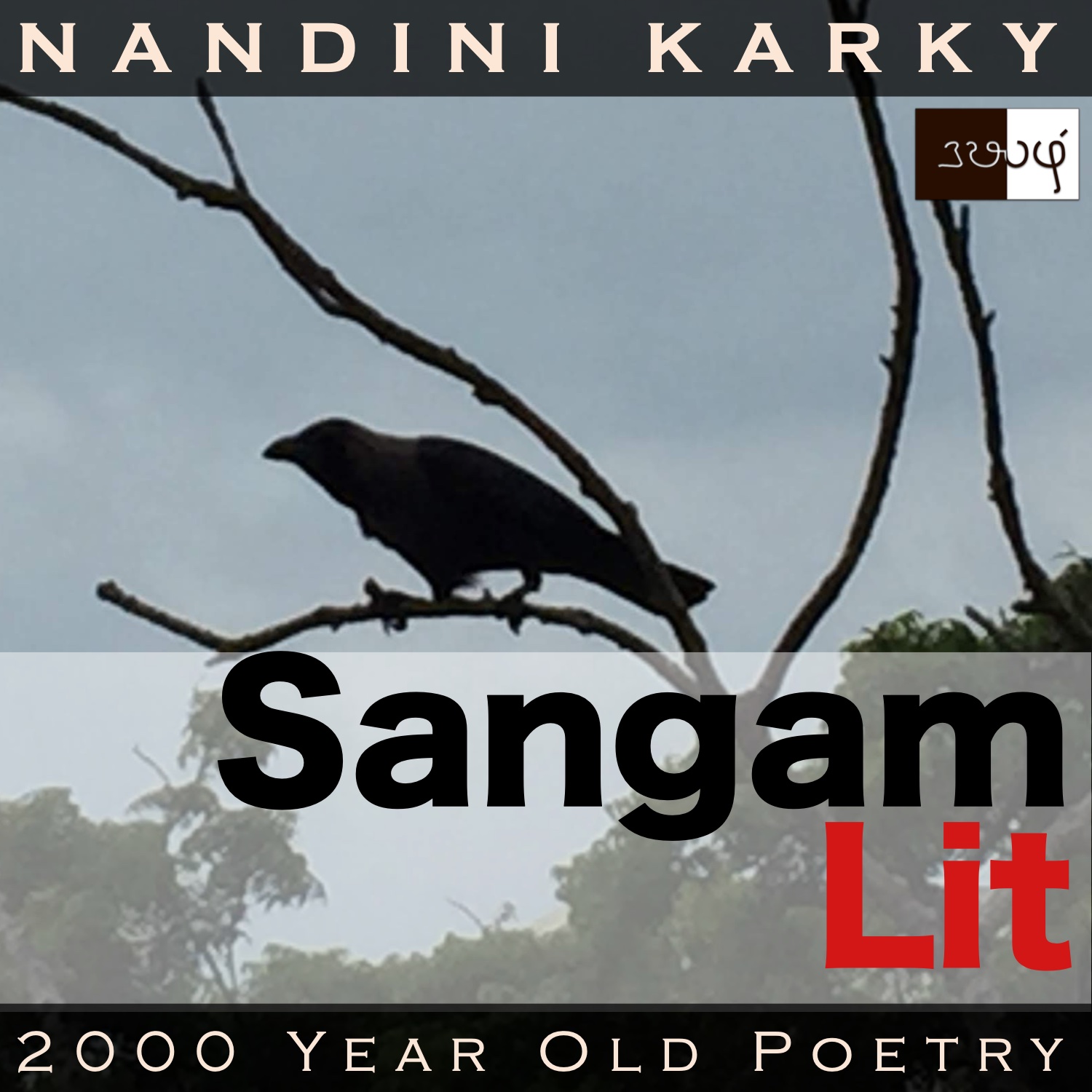Podcast: Play in new window | Download
Subscribe: Apple Podcasts | Spotify | Amazon Music | Android | iHeartRadio | Email | TuneIn | RSS | More

In this episode, we learn of offerings made to birds and the significance of bird calls, as depicted in Sangam Literary work, Kurunthogai 210, penned by Kaakkai Paadiniyaar Nachellaiyaar. Set in the forest regions of ‘Mullai’, the verse speaks in the voice of the confidante to the man, in response to his praise about the friend’s comforting presence to the lady in the man’s absence.
திண் தேர் நள்ளி கானத்து அண்டர்
பல் ஆ பயந்த நெய்யின், தொண்டி
முழுதுடன் விளைந்த வெண்ணெல் வெஞ் சோறு
எழு கலத்து ஏந்தினும் சிறிது-என் தோழி
பெருந் தோள் நெகிழ்த்த செல்லற்கு
விருந்து வரக் கரைந்த காக்கையது பலியே.
At the core, is the sound of ‘a crow’s cawing’. In the opening words ‘திண் தேர் நள்ளி’ meaning ‘Nalli, who has strong chariots’, the verse throws the spotlight on an illustrious patron of Sangam times, renowned for his generosity. Next, we meet a tribe who live predominantly in the ‘Mullai’ regions in ‘அண்டர்’ or ‘cowherds’. There’s talk of food in ‘பல் ஆ பயந்த நெய்’ referring to ‘ghee made from the milk of many cows’. A famous sea-port of the Cheras, ‘தொண்டி’, makes an appearance here. This port on the Arabian sea was a favoured destination of ancient Greek and Roman sailors and is referred to as ‘Tyndis’ in many historical texts from that period. The phrase ‘பெருந் தோள் நெகிழ்த்த’ meaning ‘that which thinned down her fleshy arms’ tells us that pining is afoot. Ending with the words ‘காக்கையது பலியே’ meaning ‘the offering made to a crow’, the verse intrigues our curiosity.
Cattle and crows drum up a characteristic beat in this verse! The context reveals that the man and lady were leading a happy, married life when the man parted away to gather wealth. After a long while, the man returns home and appreciates the confidante for taking good care of the lady during this period. To the man’s words, the confidante responds, “In the forests of ‘Nalli’, who wields powerful chariots, graze many cattle belonging to the tribe of cowherds. Ghee, made from the milk of these cattle, is blended well with white cooked rice that sprouted from white paddy in the sea-port town of Thondi. If the food thus prepared is poured into seven vessels and offered, even that wouldn’t be sufficient as the crow’s offering. For didn’t the crow caw announcing the arrival of people heading home, so as to remove the pining in my friend’s now-thinned-down once-fleshy arms!” With these words, the confidante says that she cannot take all the credit for the lady bearing with the man’s long parting.
Why does a crow get to be praised so much for human happenings? Let’s explore! The confidante starts by talking about the forests of the famous patron ‘Nalli’, who is known to possess well-built, sturdy chariots. In these forests, the cowherds live and rear cattle in huge numbers. Mentioning that, the confidante details the first ingredient in a food preparation, which is the ghee from the milk of many cows in that forest region. You’ve got ghee from ‘Nalli’s forest region. Next, you need to travel to the sea-port of Thondi and in the fertile fields, white paddy would be sprouting copiously and from these stalks, white rice should be extracted and cooked. Remember the waiting ‘ghee’, one needs to mix the cooked white rice with that, and then, seven huge vessels must be filled with mounds of that delicious ‘ghee rice’, the confidante instructs. Even if these seven vessels of food are offered, it wouldn’t be enough, she declares. When we ask, ‘to whom’, the confidante continues by saying, it’s the crow that heralded the arrival of the man and his team, and which in turn, brought some strength to the pining arms of the lady.
A clear case of deflecting praise like what we saw in Kurunthogai 193. There, the lady deflects praise rendered to her by transferring it to the man and here, the confidante does the same by transferring it to a crow. From this verse, we understand the belief of ancients in good omens and a specific one seems to be the belief that a crow cawing announced the approach of guests home. While it may appear like a mere superstition, could we probe a little to see if there’s any trace of logic there? Crows caw delightedly when there’s a surplus of food and this happens when guests come home and huge meals are prepared. Perhaps when the men were away, much cooking did not happen and so the crows might have turned up to ask ‘What’s up, ladies? Where’s our food?’. Owing to the earlier association between crows cawing and preparation of food for guests in human minds, they may have concluded that crows are announcing the arrival of guests. And this could be the origin story of the crow heralding newcomers home. In the end, it’s seeing some sign of positivity in the world outside, and who are we, to refuse that timeless yearning of the human heart!




It is only now I come to know that the word ‘பயந்த’ also means ‘made from’.